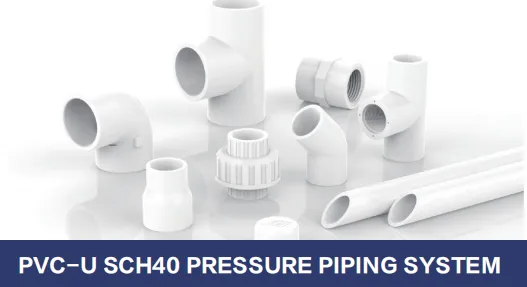At the core of any piping system's safety is the material it's made from—and PVC-U (Unplasticized Polyvinyl Chloride) is where SCH40 systems start to shine. Unlike some other plastics that might soften under pressure or corrode over time, PVC-U is engineered to be rigid, durable, and resistant to the kinds of stresses that can compromise safety in plumbing and fluid transport.
Think of it like choosing a water bottle: a flimsy plastic bottle might crack if you squeeze it too hard, but a thick, rigid one stays intact even with pressure. That's essentially what SCH40 brings to the table. The "SCH40" designation refers to the pipe's wall thickness, which is specifically calibrated to handle higher pressure levels compared to thinner-walled options. This extra thickness acts like a built-in safety buffer, ensuring the pipe can withstand the daily demands of water flow, whether it's in a home, office building, or industrial facility.
Pressure Resistance:
PVC-U SCH40 pipes are designed to handle operating pressures up to 150 psi (pounds per square inch) at 73°F, which is well above the typical water pressure found in most residential (40-80 psi) and commercial (60-100 psi) systems. This means even during peak usage—like morning showers in an apartment building or simultaneous sprinkler use in a commercial complex—the pipes won't bulge, warp, or fail.
Corrosion & Chemical Resistance:
Unlike metal pipes that can rust or corrode when exposed to minerals, chemicals, or even just regular tap water over time, PVC-U is naturally resistant to corrosion. This is a big deal for safety because corroded pipes can develop leaks, weaken structural integrity, or even contaminate water. With PVC-U SCH40, you don't have to worry about rust flakes in your drinking water or sudden pipe bursts due to material breakdown.
Non-Toxic & Hygienic:
For systems that transport potable water (the water you drink, cook with, or bathe in), safety also means keeping the water clean. PVC-U SCH40 pipes are manufactured without harmful additives like lead or phthalates, and their smooth inner surface prevents the buildup of bacteria or sediment. This ensures the water that flows through them stays safe for human contact—critical for homes, schools, and hospitals where water quality is non-negotiable.













